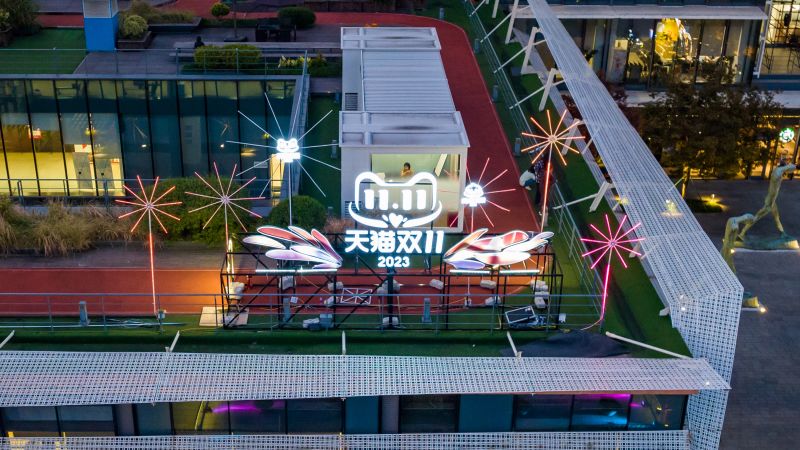Editor’s Note: Sign up for CNN’s Meanwhile in China newsletter which explores what you need to know about the country’s rise and how it impacts the world.
China’s wobbly economy has affected the world’s largest annual shopping event, and companies have launched an aggressive price war to woo customers.
The Singles Day festival, also known as “Double 11,” was created by Alibaba in 2009 and has turned into a weeks-long shopping bonanza in China. It regularly racks up more sales than Black Friday and Cyber Monday combined, and is seen as a bellwether of consumers’ willingness to spend.
Companies have come up with catchy slogans to promote their sales, including Alibaba’s “Double 11, Low Price Everyday,” JD.com’s “Truly Cheap” and Pinduoduo’s “Truly Low Price Every Day.”
“In general, [a] pricing war has been the biggest competition moat across all [Chinese e-commerce] platforms this year,” a group of Citi analysts led by Alicia Yap wrote in a research report last week, using a term that describes a company’s competitive advantages over rivals.
They expect a “muted” sale period because of lackluster economic conditions and cautious spending sentiment.
Alibaba, which owns Taobao and Tmall.com, has announced it will offer more than 80 million products “at their lowest prices this year” during its sales period, which kicked off on October 24.
JD.com is offering 50% discounts on selected electronics and the opportunity for shoppers to purchase best-selling items for only 1 yuan (14 US cents.)
The event — which officially starts on November 11, with companies offering presales a few weeks earlier — marks the biggest shopping festival since the country lifted its Covid-19 restrictions last December.
Beijing had hoped that reopening the country would boost domestic consumption and prop up growth, especially as its exports are falling and infrastructure investment is yielding diminishing returns.
But Chinese consumers are dealing with mounting challenges ranging from high unemployment rate to waning income levels, and have cut back on spending. To lure them, e-commerce platforms are offering rock bottom prices this Singles Day.
The middle class in the world’s second largest economy has not had an easy year.
Youth unemployment hit a historic high of 21.3% in June, before the government suspended the release of the data. Wage growth has also stagnated, reducing the average disposable income.
In the first nine months of 2023, retail sales increased just 6.8% from a year ago, a rate that is below pre-pandemic growth levels in 2019.
“While the government is looking for solid consumption growth, consumer spending is hampered by both lower household income growth and weak consumer confidence,” said Louis Kuijs, chief Asia economist at S&P Global Ratings.
A crisis in the housing market, where about 70% of China’s household wealth is tied up, has further curbed their desire to spend.
“Given the subdued outlook for the housing market, it will take time before consumer confidence is restored,” Kuijs said.
The massive discounts also reflect the ferocity of competition in China’s e-commerce sector.
“The jostling over prices is as much about intensified competition between the e-commerce marketplaces as it is about the state of the consumer,” said Jacob Cooke, co-founder and CEO of WPIC Marketing + Technologies, an e-commerce consultancy.
But analysts are unsure if the lower prices are enough to attract consumers.
According to a survey released on Tuesday by Bain and Company, more than three-quarters of surveyed Singles Day shoppers plan to spend less or maintain spending at 2022 levels.
“Only 53% of shoppers told us that they were excited by Singles Day, compared with 76% back in 2021,” the research firm said.
Spending is down on “fast moving consumer products,” such as food and beverage, and “large durables” closely linked to the property sector, according to WPIC Marketing + Technologies.
On social media, the hashtags “downgraded consumption” and “if I don’t buy, I can save 100%” have now become trending topics.
“I spent 250,000 yuan ($34,300) on Pinduoduo last year, but only spent 80,000 yuan ($14,890) so far this year. This is a real downgrade in consumption,” the user said, adding she hadn’t yet spent any money during the current Singles Day.
“Some promotions are fake,” said another user under the name “Nyanko.” “Merchants have raised prices before cutting them for Singles Day. How can we consume? ”
Cooke said the shopping event’s “relative attraction” for consumers has declined over the years because there are now more promotions throughout the year.
But not all consumers are cutting back.
According to Cooke, he has observed an “enormous appetite” among middle and upper class consumers for experiences or products that enhance their health, lifestyle and self-expression.
For example, sectors like vitamins, pet care, athletic apparel and even luxury products are growing rapidly.
“Consumers are actually looking to ‘upgrade’ their consumption in these sectors,” he said.
Nike, which is positioned as a premium brand in China, has reported a strong quarter for the June-to-August period. Company executives have eased investor concerns over China in an earnings call in September.
“Sport is back in China, you can just feel it,” Nike CEO John Donahoe said.
Lululemon also reported a 61% surge in its China revenue for the second quarter of this year, well above its total revenue growth of 18%. Starbucks posted a record third quarter in August, thanks to soaring revenue in China.
“That a brand like Nike can post outstanding growth in full-price sales amid other macro pressures shows that Chinese consumption demand is resilient,” Cooke said.
Read the full article here
